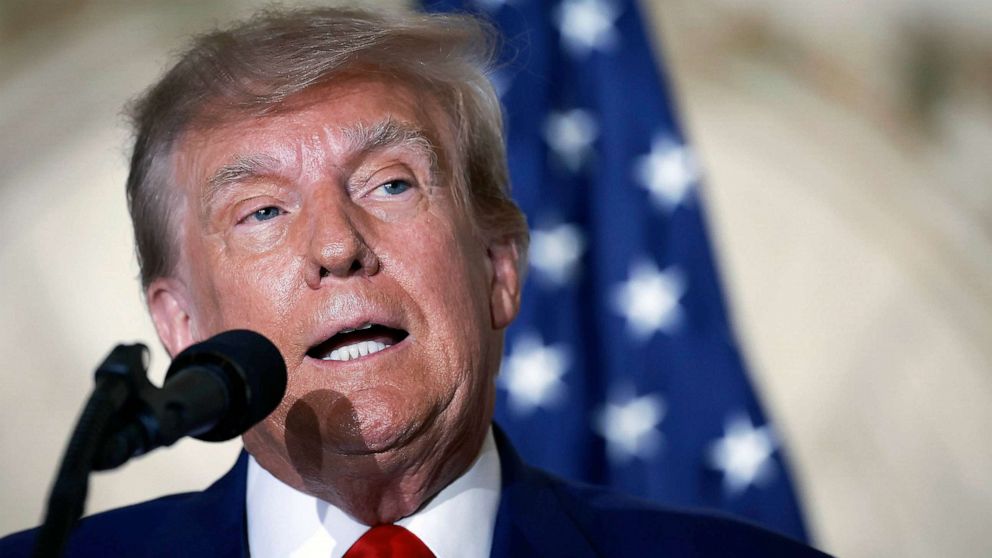Blog Post
Trump betrays social conservatives
By Jonathon Van Maren
First published at First Things
When President Joe Biden signed the Respect for Marriage Act into law on December 13, 2022, Donald Trump hosted a party at Mar-a-Lago. Ecstatic guests crowded into the ballroom, dancing to “YMCA” and celebrating what they viewed as a cultural shift that could also transform the Republican party. Trump addressed the crowd. “We are fighting for the gay community, and we are fighting and fighting hard,” he told them. “With the help of many of the people here tonight in recent years, our movement has taken incredible strides, the strides you’ve made here is incredible.” Few conservatives remarked upon how the former president (and 2024 presidential candidate) referred to the LGBT movement as “our movement.” But it is notable—as is the fact that Trump’s LGBT activism has been accompanied by a pivot away from the pro-life movement.
It began with the midterms. After the GOP took a shellacking, Trump—who endorsed a number of unsuccessful candidates—needed a narrative that excused his performance. Thus, he adopted the mainstream narrative that Dobbs hurt Republicans, insisting that it wasn’t his fault that the red wave had been a trickle. “It was the ‘abortion issue,’” he said, “poorly handled by many Republicans, especially those that firmly insisted on no exceptions, even in the case of rape, incest, or life of the mother, that lost large numbers of voters.”
Instead of acknowledging the post-Dobbs work that pro-lifers continue to do across the country, Trump went on to complain that “people that pushed so hard, for decades, against abortion, got their wish from the US supreme court and just plain disappeared, not to be seen again.” Pro-lifers pushed back. They pointed out that Georgia governor Brian Kemp won re-election by 8 points after signing a 6-week abortion ban in a state Trump lost, that Ohio governor Mike DeWine won by 25 points after signing a 6-week ban in a state Trump won by only 8 points, and that Iowa governor Kim Reynolds won by 19 points as opposed to Trump’s 8 after signing similar legislation.
Trump has adopted the progressive narrative on abortion. According to Rolling Stone and other publications, Trump is backing away as pro-life leaders ask him for commitments, telling them that the pro-life issue is “losing big” and that their talking points need to focus on exceptions. Sources say Trump has been telling those around him that Republicans are “getting killed on abortion,” which is why he has focused on his past pro-life record with religious leaders while declining to commit to any future agenda. As one leader told Rolling Stone: “[Is Trump] going to try to make us swallow getting next to nothing in return for our support?”
The Trump campaign announced this week that it opposes any federal role in regulating abortion and that the issue should be decided by the states. The leaders of the most influential pro-life groups have condemned the announcement. The Susan B. Anthony List stated that “We will oppose any presidential candidate who refuses to embrace at a minimum a 15-week national standard” and called Trump’s position “unacceptable.” Lila Rose of Live Action stated that Trump had “disqualified” himself from the nomination. Kristan Hawkins of Students for Life of America concurred.
It isn’t just abortion, either. Thanks to conservative boycotting, Anheuser-Busch has lost more than $5 billion in market value since putting the face of trans influencer Dylan Mulvaney on its Bud Light cans to commemorate his “365 Days of Girlhood.” The company has been panicking, releasing statements that have done nothing to satisfy their irate customers. But on his podcast, Donald Trump Jr. told conservatives to stop “dunking” on the beer company—because they give some GOP politicians donations. Many pundits swiftly pointed out that the Trumps were folding to corporate pressure.
Of course, the Trump family has long supported many aspects of the LGBT agenda. Donald Trump was the first GOP presidential candidate to wave a Pride flag from a campaign stage. Donald Jr. has called himself “fairly liberal” on the transgender issue. The Kushners famously squared off with the socially conservative members of the Trump administration over issues like Planned Parenthood funding. Trump’s own pro-life conversion may be genuine—several pro-life leaders who have spoken to him about the issue assure me that it is—but it appears, based on his recent statements, that he is willing to sideline the pro-life cause for political gain. It bears mentioning that Trump’s pro-life accomplishments, while certainly championed by him, were largely the work of others, such as Vice President Mike Pence. The Trumps themselves are fair-weather social conservatives.
Many pro-life Republicans have successfully run on pro-life platforms. When Republicans govern well and represent their positions effectively, pro-life policies do not hurt electoral chances. Conversely, Trump’s determination to use the national stage to air his grievances, both real and imagined, have consistently produced pitiful results. Trump, who is constitutionally incapable of taking responsibility for his bad decisions, would like to blame the pro-life movement for his own failure to lead the Republican party to victory. If he wants to see the real problem with the GOP brand, he may want to look in the mirror rather than blaming social conservatives.








